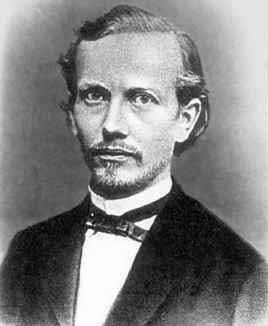Hermann Hankel facts for kids
Quick facts for kids
Hermann Hankel
|
|
|---|---|
 |
|
| Born | 14 February 1839 |
| Died | 29 August 1873 (aged 34) Schramberg, German Empire
|
| Nationality | German |
| Alma mater | Leipzig University |
| Known for |
|
| Spouse(s) | Marie Hankel |
| Scientific career | |
| Fields | |
| Institutions |
|
| Thesis | Ueber eine besondere Classe der symmetrischen Determinanten (1861) |
Hermann Hankel (born February 14, 1839 – died August 29, 1873) was an important German mathematician. He worked on many areas of mathematical analysis. He is especially known for creating the Hankel transform and the Hankel matrix. These are important tools in mathematics.
Contents
Biography
Hermann Hankel was born in Halle, Germany, on February 14, 1839. His father, Wilhelm Gottlieb Hankel, was a physicist. Hermann went to Nicolai Gymnasium in Leipzig for school.
Education and Career
In 1857, Hankel started studying at Leipzig University. He learned from his father and other famous mathematicians like August Ferdinand Möbius. In 1860, he moved to the University of Göttingen. There, he became very interested in function theory because of his teacher, Bernhard Riemann.
After writing an award-winning article, he continued his studies in Berlin. He worked with Karl Weierstrass and Leopold Kronecker. In 1862, he earned his doctorate degree from Leipzig University. A year later, he got his teaching qualifications.
In 1867, he became an associate professor at Leipzig University. In the same year, he became a full professor at the University of Erlangen–Nuremberg. He spent his last four years teaching at the University of Tübingen.
Later Life and Family
Hermann Hankel died on August 29, 1873, in Schramberg, a town near Tübingen. He was married to Marie Hankel.
Mathematical Contributions
Hermann Hankel made several important contributions to mathematics. He helped us understand numbers and mathematical ideas in new ways.
Complex Numbers and Analysis
In 1867, Hankel published a book called Theorie der Complexen Zahlensysteme. This book was about complex analysis, which deals with complex numbers. These are numbers that include the square root of negative one.
He also wrote about how to multiply negative numbers. He showed that the usual way we multiply numbers (where a negative times a negative is a positive) is the only way that makes sense if you want to follow certain rules of math.
Functions and Other Concepts
Hankel also worked on the theory of functions. Functions are like rules that connect one set of numbers to another. In 1870, he wrote about functions that change very quickly or are not continuous.
He also wrote an article in 1871 about the idea of a "limit" in mathematics. His work also highlighted the importance of certain special functions called Bessel functions of the third kind. These are now often called Hankel functions in his honor.
Linear Algebra
Hankel also brought attention to the work of Hermann Grassmann. Grassmann had developed ideas about linear algebra and the nature of space. Hankel's work helped other mathematicians see how important Grassmann's ideas were.
See also
 In Spanish: Hermann Hankel para niños
In Spanish: Hermann Hankel para niños
 | Janet Taylor Pickett |
 | Synthia Saint James |
 | Howardena Pindell |
 | Faith Ringgold |

